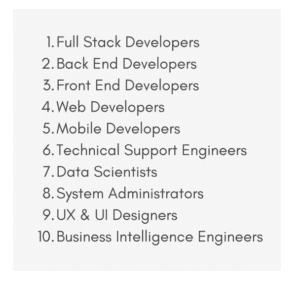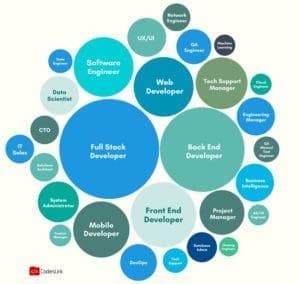
Hiring a remote full stack developer in Mexico doesn’t have to be a daunting prospect for your company. Building remote tech teams in LATAM is now a go-to solution for finding top-level talent and alleviating the uncertainties caused by the talent shortage at home. Nearshore teams have risen in favor in the last few years as the work landscape has changed and traditional outsourcing to other regions of the world has fallen out of favor.
The digital transformation of the marketplace has created an insatiable demand for software developers. Among the most sought-after are full stack developers, who work the front end and back end of a website or web application. Mexico’s evolving tech ecosystem houses a diverse pool of talent including a considerable population of full stack developers.
Mexico is now a top market for world-class software developers. Here’s what you need to know about hiring a remote full stack developer in Mexico.
Mexico’s Diverse Talent Pool of Software Developers
The word is out: the Latin American tech ecosystem is a notable breeding ground for tech talent. Our recent Tech Salaries Report 22 dove into the nuances of Mexico’s tech ecosystem and the density of engineering positions by role.
Here’s what we found.
The most common roles found are:

Based on our surveys and research, Mexico has a substantial percentage of full stack developers active in its competitive ecosystem. The average salary for the tech industry in Mexico is $3,828 USD compared to a $7,000 monthly salary expectation in the U.S.

What is the Average Salary of a Full Stack Developer in Mexico?
Companies looking to build nearshore teams or hire remote developers assess the salary expectations of the roles they seek to fill. What they have found is that compared to the United States, software developer salaries in Mexico are a cost-effective option.
In the U.S, the average salary of an intermediate full stack developer is $10,417. The industry categorizes experience into three levels: Junior, Intermediate, and Senior. Our report used this categorization for consistency. In Mexico, that salary ranges based on experience and starts off at about $2,900 and goes up to $4,880 for a senior developer.
Just like in the U.S, Mexico’s software developers’ salaries are largely based on years of experience and senior developers (9-10 years of experience) reported a 150% higher salary than Junior developers (those with 1-2 years). And yet, Advanced IT professionals in Mexico still make less than their U.S. counterparts with less than one year of experience. The big discrepancy is directly related to the cost of living in Mexico and how it compares to the U.S. It has nothing to do with talent level, experience, or creativity.
Who Are the Full Stack Developers in Mexico?
After years of working in the tech community in Mexico, CodersLink has established a network of 25,000+ software developers and sowed deep roots in the country’s competitive tech ecosystem.
Our research shows that Mexico graduates about 130,000 software engineers every year. Most of these graduates are found in the top Mexican tech cities like Mexico City, Monterrey, Guadalajara (Mexico’s Silicon Valley), Queretaro, and Merida.
Solid Education and Training
These young engineers graduate from some of the country’s top educational institutions. The Mexican government has invested in these specialist technology universities since 2006 and formed meaningful partnerships with companies to encourage on-the-job training and other skill-development programs.
The country is home to several renowned schools for software engineering including the Tec de Monterrey in Mexico City, the National Autonomous University of Mexico, and the National Polytechnic Institute. Other notable schools include the Autonomous University of Nuevo Leon and the University of Guadalajara.
The tech graduates in Latin America have another advantage over other regions often looked at for outsourcing: strong English proficiency and skills. Based on our surveys, Mexican professionals with a C1 and C2 proficiency in English (based on the Cambridge English Scale) earn more than those with an Intermediate level of English. Advanced speakers currently make up 45-50% of the IT population. The salary difference, however, creates a strong incentive for young engineers to learn and master English, which has increased the overall English proficiency throughout the region.
Through our advanced process, we have assisted companies in hiring full stack developers. For example, Gabriel Ontiveros and Jose Luis Salazar are full stack developers that connected with their current roles at BetterRX and Supernus Pharmaceuticals through CodersLink. Other developers like Alberto Perez and Alfredo Suarez have also worked through CodersLink to seek opportunities that put their skills to use as part of remote tech teams.
A Driven Tech Force Inspired to Be Part of the Future
Tech talent in Mexico seeks opportunities beyond just good pay and benefits. Software developers in the region are often interested in exciting career opportunities that offer them a part in an exciting project, the chance to be part of innovative companies, or work with ground-breaking technologies, ideas, or projects.
As we wrote back in June, top companies expanding in Latin America like Pinterest have a strategy in place for attracting the region’s top talent. One software developer in Mexico working through CodersLink revealed that her inspiration for working for a company like Pinterest was the opportunities they provided for working with Data Science and Machine Learning.
Hire Remote Full Stack Developers in Mexico and Build Your All-Star Tech Team
As far as the work landscape is concerned, there is no turning back. The changes accelerated by Covid are here to stay, and—the evidence suggests— there is a robust case to be made for the viability and potential of remote tech teams in LATAM.
As early as 2020, Deloitte published the global outsourcing survey. At that time, the leading impetus for outsourcing was cost reduction. In the mid-2000s, many companies resorted to outsourcing to regions like Eastern Europe, Asia, and the Philippines. Since then, the tech industry shifted towards building tech teams that were closer geographically and culturally. This traditional outsourcing has decreased as regions like LATAM proved their competitive power on the world stage. Recent stats show Latin America has the second-highest growth of developers globally.
As Harvard Business Review wrote this year, companies have had to find new avenues to viable tech talent, attracting top candidates by broadening their horizons in terms of where and how they hire.
During Covid, companies were faced with very practical realities in the face of a global pandemic: How do they ensure a smooth digital transformation? How do they transition their workforce? How do they remain competitive in an uncertain market?
Since Covid the landscape has been irreversibly altered: remote work, the Great Resignation (later known as the Great Reshuffle), digital nomads, and worldwide unrest (such as the conflict in Ukraine) led companies to look to LATAM as a region of unbridled potential, promise, and a proven track record.
In 2021, the region saw the biggest increase in venture capital investment. According to CB Insights data, over $20bn of venture capital circulated in 952 deals in the region. In the past few years, Latin America has seen increased startup activity, driving innovation and competition.
Mexico’s long-established tech industry meant it was ahead of the game as the world of work began changing. Since the 1960s, American companies have set up shop in the country. Even in these early years, this planted the seeds for what would become tech hub cities with a focus on tech education, training, and competition.
Access Top Tech Talent & Reduce Risk and Costs
In addition to keeping costs low, companies in various stages of growth consider the risk inherent in their decisions. Hiring a remote full stack developer in Mexico, building a tech team, or filling necessary or specialized positions to carry your project to fruition can be a difficult task, but when working with a hiring partner that takes care of the logistical aspects, finding the right talent is suddenly not such an abstract undertaking.
With our end-to-end platform, vast talent network, and stringent vetting process, we connect companies with the right candidate.
Want to learn more about how it works? Contact CodersLink today.


